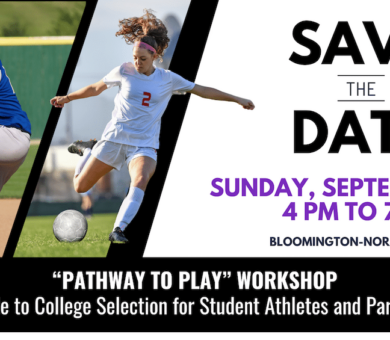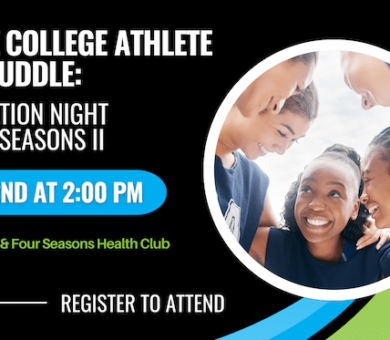Planning Your Student Athlete’s Summer Athletic Improvement and Recruiting Next Steps
Summer is here. What’s the plan for your student athlete’s recruiting process and improvement as an athlete?
Since every recruiting situation is unique and different, it’s hard to put a specific plan in place for you.
However, here are some of the basic questions to ask yourself:
- Have you had conversations with your child about college sports?
- Has your athlete mentioned they want to play college sports?
- Have you found a travel team for them, or any showcases?
- Have you communicated with colleges?
- Have you visited any campuses?
Whether your answers to the above questions are yes or no, there is more to be done with the college recruiting process. Depending on where you are on the journey, your next move should happen soon. Set a plan of action and engage your teenager to drive the plan.
Summer is a good time to accomplish recruiting tasks because there is less school and more time to spend working on the plan.
Here are some tips for both athletic improvement and the recruiting process:

Summer Club and Travel Sports
If your student-athlete is part of a club or travel team this summer, your calendar is likely already packed. From booking flights and hotel rooms to planning meals and navigating game schedules, there’s a lot to coordinate. On top of that come personal decisions: how much time off work to take, who will be traveling, and how to make it all fit into a busy few months.
It’s a full season—and an important one. But through it all, try to take it one day at a time. Your athlete will compete well some days and struggle on others. Mistakes will happen—hundreds of them—and while the temptation might be to correct each one, remember that most athletes are already their own toughest critics.
The most valuable thing you can do this summer? Offer consistent support and encouragement. Your athlete will be physically and emotionally taxed as the season progresses. Help them stay motivated, remind them to have fun, and keep reinforcing their effort and growth—not just their performance in the last game or play.
This is also a great time to start or revisit the college recruiting process. If you haven’t had the conversation yet, begin by asking your athlete if they’re interested in playing at the next level.
Already in the recruiting process? This summer may be a key moment. Coaches from all over the country are evaluating talent at tournaments, especially in June and July. Being a steady source of support during this time shows your athlete that you’re there for them, not just the sport.
Keep in mind: certain recruiting rules limit contact between coaches and athletes until certain dates or times. For example, NCAA Division I coaches have restricted communication windows. Athletes may not hear from schools until late in summer depending on the division and level of play. Avoid comparing one athlete’s journey or timing to another’s—it varies widely. Here’s a breakdown of recruiting rules by division.
And finally, if you find yourself near a college campus this summer, take the opportunity to stop by. Even an informal walk-through can give your student-athlete a sense of the environment, and help plant seeds for their future.
No Club or Travel Sports
If your student-athlete plays a sport without summer travel or team activities, this can still be a powerful time for growth—especially if there’s interest in continuing their sport at the college level.
There are four key areas they can focus on this summer:
- Fitness
- Skill development
- Nutrition
- Mental training
Even without structured team practices, there are endless ways to improve in each of these areas.
They might create a personal training plan or work with a coach or trainer to target specific skills. Strength and conditioning work can be tailored to their sport, and even a simple daily routine can make a difference.
Summer is also a great time to prioritize nutrition. Trying new healthy foods, experimenting with meal prep, and learning how to fuel the body for performance can be a game-changer. This can be a shared experience—planning meals and exploring new recipes together can be fun, and your athlete may feel the difference in their training and recovery.
Mental performance is just as important. Your athlete could work with a mental performance coach or explore resources online to build confidence, sharpen focus, and strengthen resilience. Even 10 minutes a day dedicated to mindset work can have a lasting impact. For support in any of these areas, reach out to Find My Team—we’re here to help.
As for the college recruiting process, this summer is a great time to explore. Even if your athlete is early in their high school years or plays a sport with later recruiting timelines, unofficial college visits are a valuable way to begin thinking about the future.You can schedule campus tours through admissions offices, and in some cases, you can also reach out to coaches to request a brief meeting to learn more about their program. College coaches are used to talking with prospective student-athletes and their families—it’s a normal part of the process. Even one conversation can make a difference.
Summer, ID and Elite Camps
Whether or not your athlete is playing summer club or travel ball, summer showcases, ID and elite camps are other possibilities.
Many college programs hold camps and allow their student-athletes to work the camp. This is an opportunity for your athlete to meet the coaches and players, see how they interact with each other, and see how and what they teach in their sport.
There are also ID camps for sports like soccer. Soccer ID camps are hosted by colleges, soccer organizations or clubs. These camps offer another opportunity to be seen by college coaches.
It would not be necessary to visit every Elite, ID or regular camp your athlete is invited to, especially if they already have a full summer of tournaments and events planned. It’s also costly and time consuming.
Having a plan will help you and your athlete stay organized and focused on their needs as it relates to the recruiting process.
These camps are a tool college coaches use to get their top players on campus. If your teen is invited, it’s a good sign. However, it is not definitive proof that there will be a scholarship offer or roster spot on the college team.
Time Off
Summers can be packed with tournaments, training, travel, and recruiting events. But just as important as pushing for progress is taking time to rest. Both your student-athlete—and likely you, too—need and deserve a true break from the demands of the sports world.
We strongly recommend building in time for a family vacation or getaway, even a short one. Think of it as a reset: a chance to relax, reconnect, and step away from the constant pressure and pace of athletic life.
This doesn’t need to be elaborate or expensive. Whether it’s a weekend road trip, time at home without schedules, or a few days in nature, what matters most is the intention: to disconnect, recharge, and just be present.
Rest and recovery are part of peak performance. Planning this break may require flexibility and trade-offs, but the long-term benefits—to both mental well-being and family connection—are absolutely worth it.
Ask For Help if You Need It
If you or your student-athlete could use support with creating a summer plan, building a recruiting strategy, or identifying areas for athletic or personal development, we’re here to help. Reach out to us at hello@findmyteam.com or visit our website to schedule a free session tailored to your goals.
Summer can be a meaningful and exciting season—but it can also feel overwhelming. Take it one day at a time and have fun with it. Time flies and it will soon be on to the next thing.




